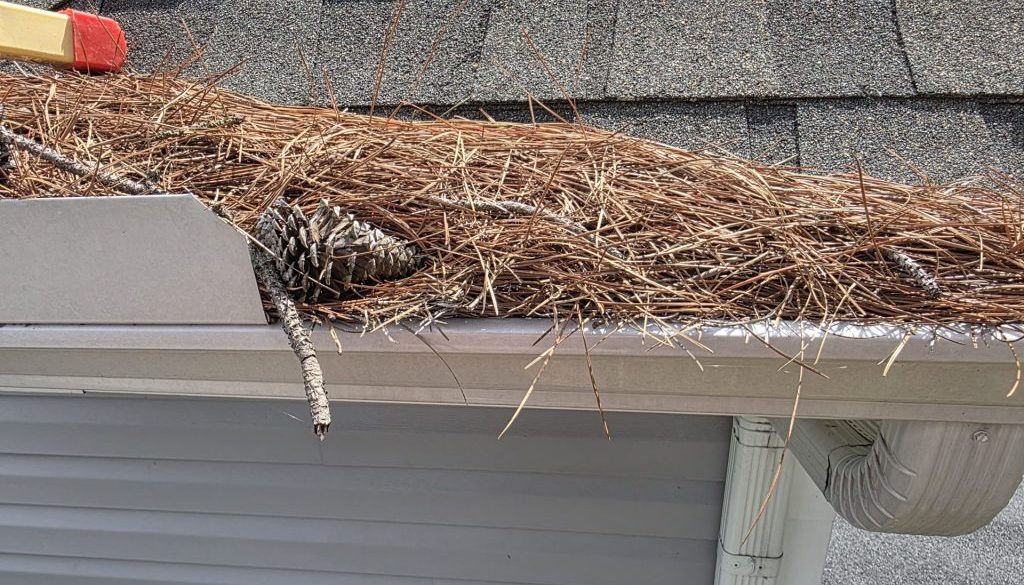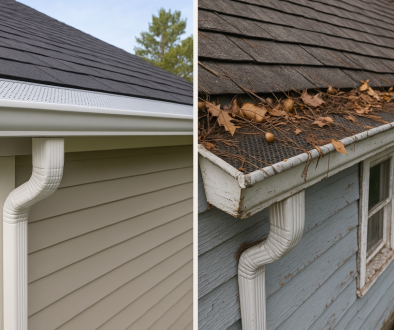Preparing Your Gutters for Fall in Delmarva: A Homeowner’s Guide
As the air turns crisp and leaves begin their slow descent, homeowners across Delmarva—from the quiet neighborhoods of Salisbury, MD to the bustling beach towns of southern Delaware—know it’s that time of year again: gutter season.
But here’s a question: when was the last time you looked up at your gutters and thought, “Am I really ready for fall?” If you can’t remember, you’re not alone. Gutters are one of the most overlooked parts of home maintenance. Yet, they are also one of the most important when it comes to protecting your property.
In this guide, we’ll break down why preparing your gutters for fall is essential, what steps you can take right now, and how homeowners in areas like Salisbury, Ocean City, Bethany Beach, Rehoboth Beach, and the surrounding Delaware shore towns can avoid costly mistakes this season.
Why Gutters Matter More in the Fall
Think of gutters as your home’s unsung heroes. They quietly manage thousands of gallons of rainwater every year, redirecting it away from your foundation, siding, and landscaping. In summer, they handle occasional thunderstorms. But in the fall? The game changes.
Leaves, twigs, acorns, and pine needles don’t just fall—they pile up. Before long, those lightweight leaves can turn into a soggy, heavy mess that clogs your gutters and creates standing water. That water then has only one place to go: over the edge, down your siding, and straight toward your foundation.
Do you really want to risk basement flooding or foundation cracks because of a few neglected leaves?
The Delmarva Challenge: Local Factors to Keep in Mind
Preparing your gutters in Delmarva isn’t the same as preparing them in the Midwest or even farther north in New England. Our region has its own quirks:
-
Humidity and coastal storms
Living near Salisbury or along the beaches in Maryland and Delaware means dealing with sudden heavy rains and salty air. That moisture accelerates rust in older gutter systems and makes clogs swell faster.
-
Tree coverage
Delmarva is full of beautiful oaks, maples, and pines. Picturesque? Absolutely. But come October and November, they drop a relentless supply of leaves and needles directly into your gutters.
-
Beach winds
Near Rehoboth Beach, Bethany Beach, or Ocean City, coastal winds can whip sand and debris into your system, adding an abrasive element that shortens gutter lifespan.
-
Temperature swings
In Salisbury and the inland parts of southern Delaware, warm days and chilly nights in fall create condensation that mixes with debris, creating slimy blockages that are harder to clear.
In short: homeowners here need to be extra proactive.
Step 1: Inspect Before You Clean
Would you ever dive into a project blind? Of course not. The same goes for your gutters.
Before pulling out the ladder, walk around your home and inspect the gutter system from the ground. Ask yourself:
-
Are the gutters sagging in any spots?
-
Do you see rust, holes, or peeling paint?
-
Are downspouts firmly attached, or are they pulling away?
-
Is water staining your siding or pooling around the foundation?
Noticing issues early can mean the difference between a quick Saturday cleanup and a $2,000 repair job.
Step 2: Clear the Debris (Safely)
Yes, you’ll probably need to get up on a ladder. But safety first—especially if you live near the windy beaches or in tall two-story homes in Salisbury’s suburbs.
Tips for safe gutter cleaning:
-
Always use a sturdy ladder on level ground.
-
Wear gloves—wet leaves and pine needles can be surprisingly sharp.
-
Use a scoop or small shovel to remove debris rather than your hands.
-
Have a bucket or tarp nearby to collect waste instead of dropping it on your lawn.
Once cleared, rinse the system with a garden hose. This helps flush out smaller particles and ensures downspouts are flowing freely.
Step 3: Don’t Forget the Downspouts
Here’s a mistake many homeowners in southern Delaware and coastal Maryland make: they clean the gutters but ignore the downspouts.
Think about it—what good are clear gutters if the water bottlenecks at the exit point? A clogged downspout can cause water to back up and overflow just like a blocked gutter.
Run water through each downspout and watch where it exits. Does it pour out quickly, or does it trickle? If water isn’t flowing freely, you may need to snake it with a plumber’s auger or use a hose on high pressure to blast the clog out.
Step 4: Check the Flow Direction
When was the last time you checked where your downspouts actually send water?
If you live in Salisbury or one of the Delaware beach communities, water should flow at least 5–10 feet away from your foundation. Otherwise, it’s just soaking the soil near your home and increasing the risk of foundation cracks or basement flooding.
If needed, install gutter extensions or splash blocks. They’re inexpensive but can save you thousands in water damage.
Step 5: Gutter Guards—Your Best Line of Defense
Let’s be honest—no one looks forward to climbing a ladder every fall, scooping out wet, heavy leaves, and flushing downspouts. Wouldn’t it be easier if you could prevent most of that mess from happening in the first place? That’s where gutter guards come in.
For homeowners across Salisbury, Ocean City, and the Delaware beaches, gutter guards aren’t just a convenience—they’re a long-term solution. By creating a barrier that keeps out leaves, pine needles, and even acorns, guards dramatically reduce the chances of clogs. That means fewer overflows, less water damage, and more weekends spent enjoying fall festivals or the beach instead of cleaning your gutters.
Think about it: how much is your time worth? Even if you only spend a few hours twice a year on gutter cleaning, those hours add up. Add the cost of equipment, safety risks, or hiring professionals every season, and suddenly the one-time investment in guards starts looking like a smart financial move.
And here’s the kicker—gutter guards don’t just save time; they protect your home’s lifespan. By keeping debris out, they reduce standing water, which means less rust, fewer leaks, and less chance of ice dams forming in the winter. In coastal towns like Rehoboth and Bethany Beach, where salt air already accelerates wear and tear, that extra layer of defense is invaluable.
Are gutter guards perfect? No system is completely maintenance-free. But instead of climbing the ladder twice a season, you may only need a quick rinse once a year. That’s a huge difference—and peace of mind knowing your gutters are working even during the heaviest fall storms.
So, if you’re serious about protecting your investment and making life easier, gutter guards are no longer optional—they’re essential.
Step 6: Professional Inspection and Maintenance
Sometimes, DIY isn’t enough.
If your gutters are old, sagging, or constantly clogging, it may be time to call in a professional. In places like Salisbury or the Delaware beaches, many local companies specialize in gutter cleaning and replacement.
A professional can:
-
Spot small leaks before they become major problems.
-
Ensure gutters are pitched correctly.
-
Install seamless systems that resist leaks better than sectional gutters.
Think of it as insurance. Spending a few hundred now can prevent thousands in repairs later.
Seasonal Timing: When Should You Clean?
Here’s the tricky part about fall in Delmarva: the leaves don’t all drop at once.
In Salisbury, the peak may come earlier, while closer to Bethany Beach or Rehoboth Beach, warmer coastal air keeps trees hanging onto their leaves longer.
That’s why it’s best to plan two cleanings each fall:
-
Early fall (late September to early October) when the first leaves begin to drop.
-
Late fall (November), once most of the leaves are down.
That way, your gutters are ready for heavy winter rains—and even the occasional snow or ice storm.
The Hidden Risks of Neglecting Your Gutters
Still tempted to put this off? Consider what can happen if you ignore your gutters this fall:
-
Roof damage: Water backs up under shingles, leading to leaks.
-
Basement flooding: Overflowing gutters dump water at your foundation.
-
Pest problems: Stagnant water in clogged gutters attracts mosquitoes, while debris piles create cozy nests for birds or rodents.
-
Mold growth: Dampness spreads to siding, attics, or basements.
Would you really want to deal with any of these issues in the middle of winter?
Local Angle: Salisbury and the Beaches
In Salisbury, many neighborhoods feature older homes with mature trees. These are beautiful, but they create heavy leaf fall that can overwhelm gutters quickly. Homeowners here should be extra vigilant about multiple cleanings.
At the Delaware beaches—Rehoboth, Bethany, Dewey—salt air and sandy winds accelerate wear and tear. Even newer gutter systems may show rust or discoloration faster than inland systems. Regular inspections are critical.
And for Ocean City homeowners, vacation rental properties add another wrinkle: guests aren’t going to clean the gutters for you. Regular professional maintenance ensures your property stays rental-ready and protected year-round.
Conclusion: Fall Readiness Starts Above Your Head
Preparing your gutters for fall in Delmarva is more than a chore—it’s a smart investment in your home’s health.
So ask yourself: when the next heavy rain hits Salisbury, Rehoboth, or Ocean City, do you want to watch water flow safely away from your house—or do you want to see it pouring over clogged gutters, soaking your siding and foundation?
A little preparation now saves headaches later. Grab your gloves, set up the ladder, and give your gutters the attention they deserve. Or, Contact us here at Reflections Exterior Services and we’ll be happy to do it for you!





